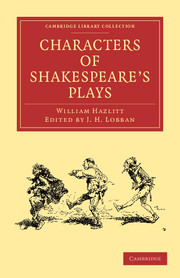Book contents
- Frontmatter
- Preface
- Contents
- Introduction
- Preface
- Cymbeline
- Macbeth
- Julius Cæsar
- Othello
- Timon of Athens
- Coriolanus
- Troilus and Cressida
- Antony and Cleopatra
- Hamlet
- The Tempest
- The Midsummer Night's Dream
- Romeo and Juliet
- Lear
- Richard II
- Henry IV
- Henry V
- Henry VI
- Richard III
- Henry VIII
- King John
- Twelfth Night; or, what you will
- The Two Gentlemen of Verona
- The Merchant of Venice
- The Winter's Tale
- All's Well That Ends Well
- Love's Labour's Lost
- Much Ado About Nothing
- As You Like It
- The Taming of the Shrew
- Measure for Measure
- The Merry Wives of Windsor
- The Comedy of Errors
- Doubtful plays of Shakespear
- Poems and Sonnets
- Notes
All's Well That Ends Well
Published online by Cambridge University Press: 07 September 2010
- Frontmatter
- Preface
- Contents
- Introduction
- Preface
- Cymbeline
- Macbeth
- Julius Cæsar
- Othello
- Timon of Athens
- Coriolanus
- Troilus and Cressida
- Antony and Cleopatra
- Hamlet
- The Tempest
- The Midsummer Night's Dream
- Romeo and Juliet
- Lear
- Richard II
- Henry IV
- Henry V
- Henry VI
- Richard III
- Henry VIII
- King John
- Twelfth Night; or, what you will
- The Two Gentlemen of Verona
- The Merchant of Venice
- The Winter's Tale
- All's Well That Ends Well
- Love's Labour's Lost
- Much Ado About Nothing
- As You Like It
- The Taming of the Shrew
- Measure for Measure
- The Merry Wives of Windsor
- The Comedy of Errors
- Doubtful plays of Shakespear
- Poems and Sonnets
- Notes
Summary
All's Well that Ends Well is one of the most pleasing of our author's comedies. The interest is however more of a serious than of a comic nature. The character of Helen is one of great sweetness and delicacy. She is placed in circumstances of the most critical kind, and has to court her husband both as a virgin and a wife: yet the most scrupulous nicety of female modesty is not once violated. There is not one thought or action that ought to bring a blush into her cheeks, or that for a moment lessens her in our esteem. Perhaps the romantic attachment of a beautiful and virtuous girl to one placed above her hopes by the circumstances of birth and fortune, was never so exquisitely expressed as in the reflections which she utters when young Rousillon leaves his mother's house, under whose protection she has been brought up with him, to repair to the French king's court.
“Helena. Oh, were that all–I think not on my father,
And these great tears grace his remembrance more
Than those I shed for him. What was he like?
I have forgot him. My imagination
Carries no favour in it, but Bertram's.
I am undone, there is no living, none
If Bertram be away. It were all one
That I should love a bright particular star,
And think to wed it; he is so above me :
In his bright radiance and collateral light
Must I be comforted, not in his sphere. […]
- Type
- Chapter
- Information
- Characters of Shakespeare's Plays , pp. 215 - 218Publisher: Cambridge University PressPrint publication year: 2009First published in: 1908

